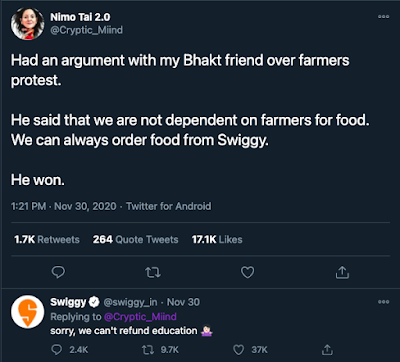'Swiggy's Swag' or 'Swiggy's a Slag'?
So, this happened.
A friend asked whether a corporate brand like Swiggy needs to wade into current politics, and if that is the job of a brand. He also asked that if brands shouldn't stick to delivering a great customer experience and if they care for the society, then shouldn't they solve for education in their communities or hunger or climate change rather than politics.
I disagree. I think Swiggy reacted to an item connected clearly by a straight line to their business: food, and they got an equal amount of people loving it and people hating it. My personal opinion is:
- Those who resolved to boycott it and those that vowed to love it cancel each other out. There is probably no net loss of business.
- The other brand, Zomato, is already aligned with Swiggy's own philosophy (and quite publicly so). Where else will the boycotting customer go? I do not see any VC funding another aggregator with a "Not political like Swiggy or Zomato" line on their pitch decks as the only differentiator.
- People have short memories. The market forgets and goes back to normal most times. Unless it has made a mistake on a galactic scale, which this one isn't.
- The TG nowadays, on both sides, does kinda expect their brand to take a stand. Also, what is 'political' for one is 'principled' for another. After all, brands that last are the ones that have and stick by their principle. Even brands like Google were panned when they agreed to work with the DoD to make software that was widely seen as contravening their 'Don't be evil' motto.
- There is nothing like 'non-political' in 2020.
- All publicity is good publicity.
 As for the other argument about what brands can do if they must intervene in social situations ('solve for education in their communities or hunger or climate change'), my views are that unfortunately or fortunately, solutions (or even mere discussions or differences of opinion) on education, science, poverty, hunger, climate change, shelter, drinking water, women's rights, equality, land reforms, fair play, justice, affirmative action to atone for and correct the sins of our forefathers, or even the eternal tussle between economic systems (that very much affect the core of doing business) are all political in nature.
As for the other argument about what brands can do if they must intervene in social situations ('solve for education in their communities or hunger or climate change'), my views are that unfortunately or fortunately, solutions (or even mere discussions or differences of opinion) on education, science, poverty, hunger, climate change, shelter, drinking water, women's rights, equality, land reforms, fair play, justice, affirmative action to atone for and correct the sins of our forefathers, or even the eternal tussle between economic systems (that very much affect the core of doing business) are all political in nature.The interesting part is that this is not a new revelation or discovery. These conversations always were political. And companies and brands always took sides. Just that with the advent of always-on, omnipresent, universally accessible, mobile, never deletable, never forgettable, never 'cleansable' social media, this has come in sharp relief and one can see not just the end message of the brand (as it used to be once, not long ago), but the entire process, and the people behind it all, including any conflict they may have had, are having, or have in the future regarding that specific message. In effect, the character of the brand which was always something that customers primarily 'bought' (or as advertisers and marketers prefer to call it, the 'story') is now more transparent, more in your face, and more definitely clearer, with nothing to hide behind and nowhere to hide it. So, those brands who embrace this new openness (nakedness?) have a higher chance of survival than those who choose to pretend that they are apolitical, and can remain so for long.
The reason for this is simple: it is because, and I repeat, there is nothing like 'non-political' in 2020. In fact, there never was.


Comments
Post a Comment
Comments to this blog are moderated. Please be patient once you submit your comment. It will appear soon...